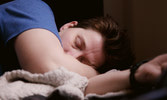What You Need to Know About Sleep Apnea
If you’ve noticed unusual sleeping patterns in yourself or your bed partner, figuring out if it’s sleep apnea is a great first step. This sleep disorder is more common than you may think, and understanding what it is, what symptoms to look for and what causes it is important for knowing what the next step is. Keep reading to find the answers to your sleep apnea questions.
What Is Sleep Apnea
Sleep apnea, while common among adults, is serious and requires treatment to prevent complications down the road. This sleep disorder causes pauses in breathing while you sleep due to a blocked airway. Because your airway isn’t fully open, the amount of air reaching your lungs is limited. It often causes loud snoring and choking noises, leaving you oxygen deprived, tired and fatigued even after a full night of sleep.
Symptoms to Look Out For
Since you’re asleep when the most obvious symptoms take place, sleep apnea can be hard to catch when less severe. The following symptoms are signs you or your loved one might suffer from sleep apnea:
- Loud snoring
- Headache, dry mouth or sore throat in the morning
- Episodes of paused breathing during sleep
- Abrupt gasping or choking during sleep
- Sleepiness during the daytime
Most Common Causes
The following factors increase your risk of sleep apnea:
- Obesity: The most common factor in sleep apnea is excess weight. Extra fat around the upper airway can cause obstructed breathing.
- Males: It’s 2-3 times more likely for men to have sleep apnea than women.
- Thicker neck: A thicker neck may mean a narrower airway.
- Age: While sleep apnea is possible in children, it’s more common in older adults.
Sleep Apnea Treatment
Following your diagnosis, a treatment program will begin. The most recommended treatment is CPAP therapy, or continuous positive airway pressure therapy. This form is effective, non-invasive and safe. With a CPAP machine, air is pushed through a CPAP mask, passing through your nose and throat. This pressure keeps the airway open and allows for continuous breathing throughout the night.
CPAP Compliance
Getting used to wearing a CPAP mask at night can be tricky, but advanced technology and comfort features can make the transition easier. Machines are made to be small and quiet, benefitting both you and your bed partner.
While being diagnosed with sleep apnea isn’t great news, knowing and starting treatment is much better than experiencing the damaging effects untreated sleep apnea has on your body. To find out how we help with sleep apnea and ways we can benefit you, click here or contact us!

